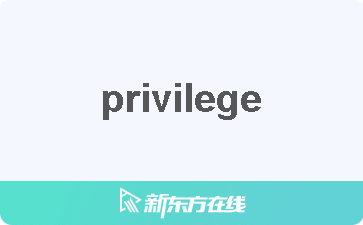- 雅思资讯
- 雅思备考
- 雅思试题
- 互动辅导
新东方-柯林斯雅思备考词典
privilege
[NOUN]

privileges
1. [C 可数名词] (某人或某团体拥有的)特权
A privilege is a special right or advantage that only one person or group has.
双语例句
例:The Russian Federation has issued a decree abolishing special privileges for government officials.
俄罗斯联邦已颁布了一条取消政府官员特权的法令。
例:the ancient powers and privileges of the House of Commons.
下议院古老的权力和特权。
2. [U 不可数名词] (一小部分人因其财富或与有权势的人的关系而拥有的)特权
If you talk about privilege, you are talking about the power and advantage that only a small group of people have, usually because of their wealth or their connections with powerful people.
双语例句
例:Pironi was the son of privilege and wealth, and it showed.
皮罗尼是富贵人家的子弟,这一点是明摆着的。
例:Having been born to privilege in old Hollywood, she was carrying on a family tradition by acting.
她出身于老好莱坞名门,继承了演戏的家族传统。
3. [SING 单数型名词] 荣幸
You can use privilege in expressions such as be a privilege or have the privilege when you want to show your appreciation of someone or something, or to show your respect.
双语例句
例:It must be a privilege to know such a man.
认识这样一个人必是一种荣幸。